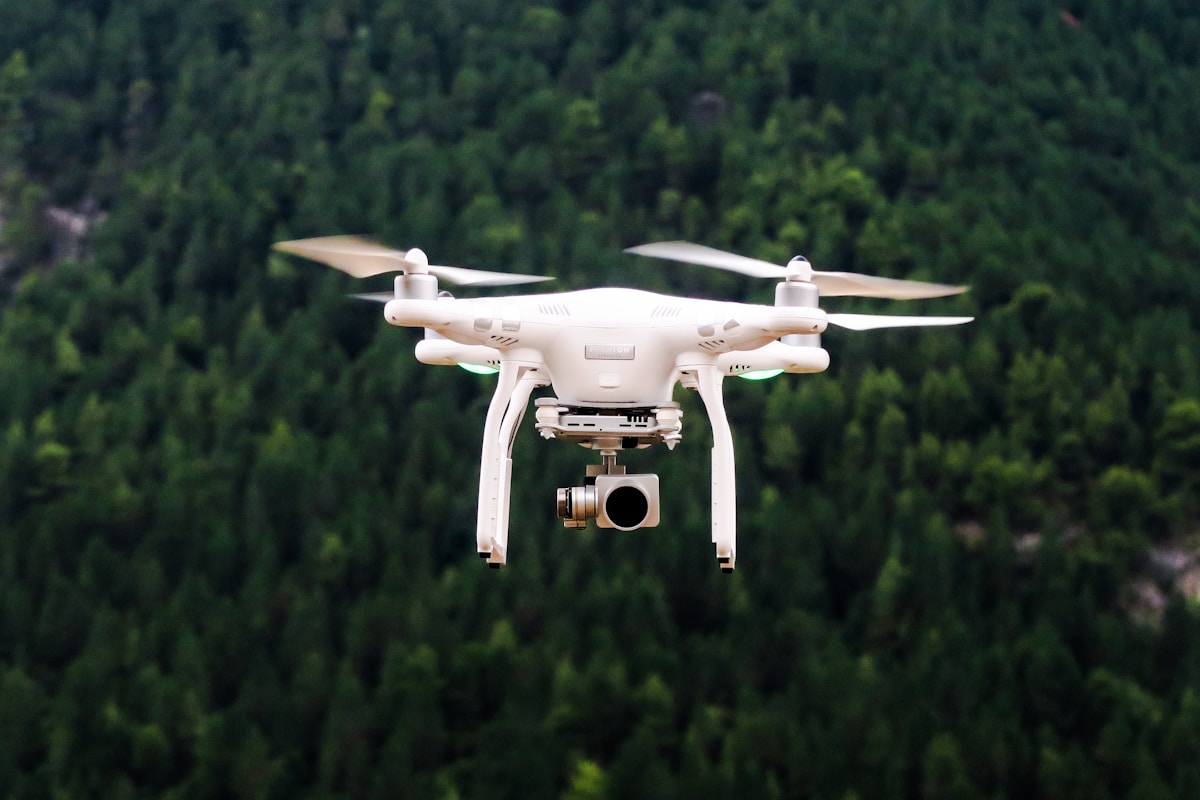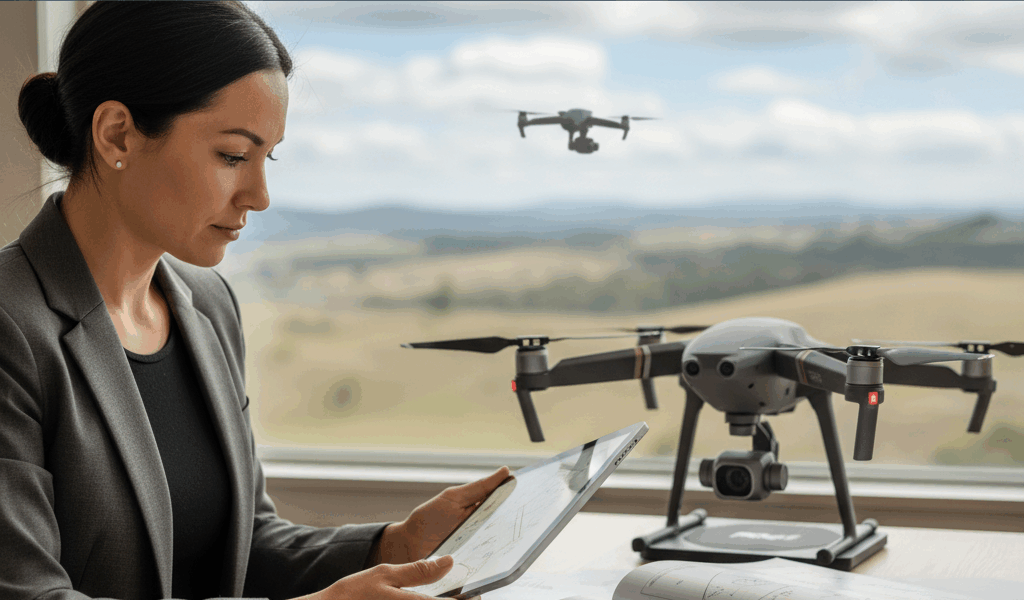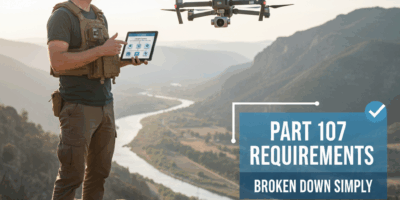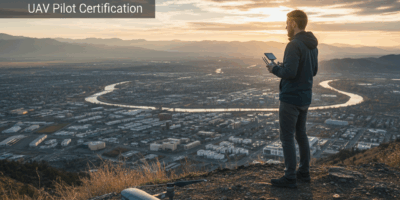Part 107 test preparation has gotten complicated with all the study materials, practice tests, and conflicting advice flying around. As someone who’s not only passed the test myself but helped prepare dozens of pilots for their exam day, I learned everything there is to know about what actually matters in those final hours before you walk into the testing center. Today, I will share it all with you.
Test day nerves are real, even if you’ve studied thoroughly. The difference between passing and having to retake the exam often comes down to preparation – not just knowing the material, but being physically and mentally ready for the testing experience itself. That’s what makes proper test day preparation endearing to us certificated pilots – it’s the final piece that brings everything together.
Probably should have led with this section, honestly, but here’s your comprehensive test day checklist:
**The Night Before**
Don’t cram the night before. Seriously. If you don’t know the material by then, staying up until 2 AM trying to memorize weather minimums isn’t going to help. Instead, do a light review of your weakest areas, then get a good night’s sleep. Your brain needs rest to perform well on the exam.
Double-check your testing center location and what time you need to arrive. Most testing centers want you there 15 minutes early. Map out your route, check traffic patterns for that time of day, and plan to arrive with extra time. Rushing in stressed because you got lost is not how you want to start your exam.
**Required Documents and Materials**
You MUST bring valid government-issued photo ID. This means a driver’s license, passport, or state ID card. It needs to be current – expired IDs won’t work. International test-takers should bring their passport. Without proper ID, you won’t be allowed to test, and you’ll forfeit your testing fee.
You’ll also need your FTN (FAA Tracking Number) from your IACRA application. Print this out or have it easily accessible on your phone. The testing center needs this to process your results.
**What You Can Bring**

Testing centers allow specific tools that you’ll want to have:
– **E6B Flight Computer:** Either the manual circular version or an electronic E6B. You’re allowed to use either, so bring whichever you’re most comfortable with. Practice with it beforehand – don’t show up with a brand new calculator you’ve never used.
– **Plotter:** For measuring distances and courses on sectional charts. A simple aviation plotter works fine.
– **Basic Calculator:** If you’re not using an electronic E6B, a simple calculator can be helpful. Check with your specific testing center about their calculator policy.
The testing center will provide you with the chart supplement and any reference materials you need during the exam. You cannot bring your own study guides, notes, or reference materials.
**What You Cannot Bring**
Leave these at home or in your car:
– Phones (they’ll make you put it in a locker)
– Smart watches
– Study materials or notes
– Bags or backpacks (usually not allowed in the testing room)
– Food or drinks
– Recording devices of any kind
Testing centers are strict about this. They’ll provide a locker for your personal items. Don’t try to sneak anything in – you’ll get caught, and you’ll be disqualified.
**Day-Of Physical Preparation**

Eat a proper meal before your test. Not a huge meal that makes you drowsy, but something substantial. Your brain runs on glucose – give it fuel. Avoid excessive caffeine if you’re not a regular coffee drinker. The last thing you need is caffeine jitters during the exam.
Dress comfortably. Testing centers can be cold, so consider bringing a light jacket. Wear layers. Being uncomfortable for 2+ hours affects your concentration.
Use the bathroom before you go into the testing room. While you can take bathroom breaks during the exam, the clock doesn’t stop. Every minute you’re away is a minute less for answering questions.
**Mental Preparation Strategies**
Have a test-taking strategy going in. Plan to do a quick first pass through the entire exam, answering questions you’re confident about and marking difficult ones for review. Don’t get stuck on a hard question – move on and come back to it.
Remember that you have 2 hours for 60 questions. That’s 2 minutes per question on average. Some questions take 30 seconds, others might take 5 minutes (especially weather interpretation or chart reading). Pace yourself accordingly.
**Review Your Weak Areas One Last Time**
On test morning, do a quick 15-20 minute review of your weakest subject areas. For most people, this is weather interpretation (METAR/TAF) or sectional chart reading. Don’t try to learn new material – just refresh what you already know.
Practice reading a few METARs and TAFs. Look at a sectional chart and identify airspace, airports, and obstacles. Get your brain warmed up for the types of questions you’ll see.
**At the Testing Center**
Arrive early. Check in with the proctor. They’ll verify your ID, collect your materials for the locker, and give you the testing center rules. Listen carefully to the instructions.
You’ll be given scratch paper and a pen/pencil. Use this liberally. Write down information from questions you want to reference later. Work through calculations on paper. Draw diagrams if it helps you visualize problems.
When you start the test, you’ll typically have a tutorial period that doesn’t count against your time. Use this to familiarize yourself with the testing interface and figure out how to mark questions for review.
**During the Exam**
Read each question carefully. The FAA loves to use words like “except,” “not,” and “least” that reverse the meaning of the question. Circle or mentally note these qualifiers.
For scenario-based questions, read the entire scenario first, then look at what they’re asking. Don’t start answering before you understand the full context.
If you’re truly stuck between two answers, trust your first instinct unless you have a concrete reason to change it. Overthinking often leads to changing correct answers to incorrect ones.
**After You Finish**
If you finish early and have time remaining, review your marked questions. Check your work on calculations. Read through questions one more time to catch any you might have misread.
When you submit your exam, you’ll get your results immediately. The computer will print out a score report. If you passed, you’ll receive a temporary certificate that’s valid while you wait for your permanent remote pilot certificate from the FAA.
**What If You Don’t Pass?**
If you don’t pass, don’t panic. Your score report shows which knowledge areas you missed questions in. This tells you exactly what to study for your retake. You can test again after 14 days. Many successful pilots didn’t pass on their first attempt – it’s not the end of the world.
**The Bottom Line**
Test day success is about more than knowing the material – it’s about being prepared for the testing experience itself. Bring the right materials, get proper rest, arrive early, and have a strategy for working through the exam. The Part 107 test is challenging but very passable with proper preparation. You’ve studied for this. Trust your preparation, stay calm, and show what you know.



